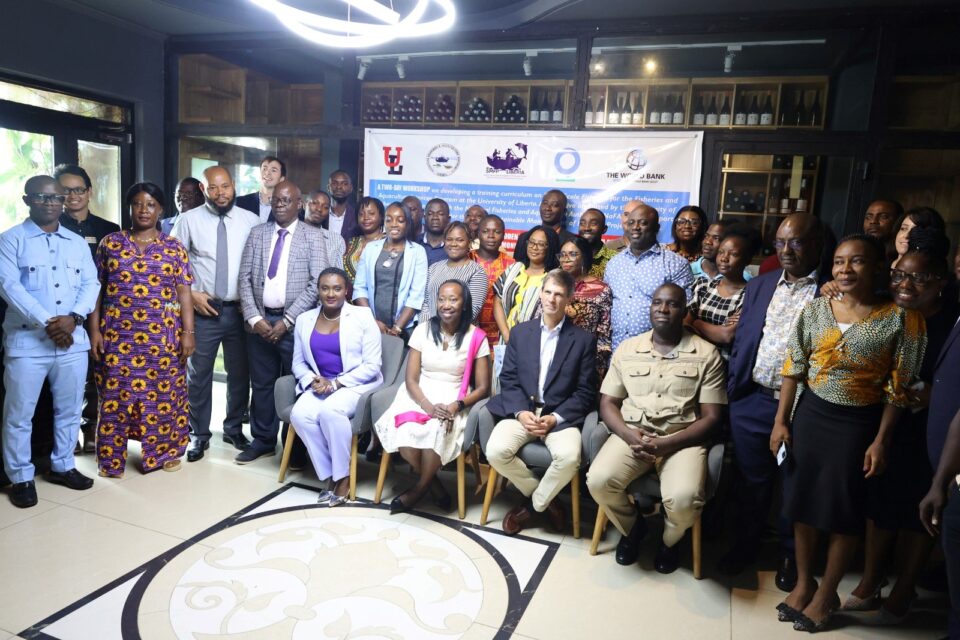Liberian Fisheries Boss mentions
PHOTO: NaFAA DG Glassco, World Bank Country Manager, and others in Group Photo
The Director General of the National Fisheries and Aquaculture Authority (NaFAA) has highlighted the significance of small-skills fisheries in the Liberian Fisheries sector describing them as the heartbeat of the fishing communities across the Country.
Speaking Tuesday, September 10, 2024, in Monrovia at Royal Hotel, during the opening session of a three-day fisheries workshop centered on the development of small-scale fisheries training curriculum for future leaders, organized by the University of Liberia Fisheries and Aquaculture Department and the Liberian Fisheries Authority, NaFAA in collaboration with Duke University, FAO, and Conservation International (CI), Madam Emman Metieh Glassco stressed that small-scale fisheries provide livelihoods for millions of people, including some of the most vulnerable populations -women, youth and Indigenous fishers.
Madam Glassco said, in Liberia, small-skill fisheries are the backbone of food security, nutrition, and income generation for many rural families disclosing further that small-scale -fisheries not only offer fish for consumption but a foundation for economic growth, social stability, and environment.
Moreover, the Liberian Fisheries Authority Director General observed that small-skills fisheries have over the years remained in the shadows, stating that they have been underappreciated, under-documented, and under-supported, noting that “it is time we change this narrative”.
Madam Glassco said by adopting the illumining hidden harvest approach, the Government commits to uncovering the full scope of small-scale fisheries to truly understand their importance, challenges, and potential. She noted this approach will enable the Fisheries Authority to make more informed decisions, to craft policies that address what she termed as the real needs of fishers, and to strengthen the resilience of the sector.
Commenting further on the composition of the curriculum, DG Glassco noted that “we have come together not just to develop a training curriculum, but to build the foundation for a future sustainable fisheries management”
Meanwhile, declaring the three-day event open, Madam Glassco highlighted three cardinal recommendations including, inclusivity, sustainability, and collaboration. She recommended that the curriculum be inclusive and urged the voices of women, youth, and marginalized groups to be at the center of the discussions and decisions.
Madam Glassco also urged the Organizers to keep sustainability as a focus as the fisheries resources are not infinite, therefore, it is the fisheries authority’s responsibility to manage the resources wisely.
Madam Glassco noted that collaboration between government, communities, international organizations, and the private sector is essential in achieving what she termed as a meaningful and lasting change in the small-scale fisheries sector.
Also speaking at the start of the three-day event, World Bank Country Manager Madam Georgia Wallen said “Today’s event represents an investment in Liberia’s future leaders in the fisheries and aquaculture sector.”
Madam Wallen said the adoption of the “Illuminating hidden harvests global approach for assessments, analysis, and monitoring of small-scale fisheries” is an important step forward.
“on behalf of the World Bank, I want to extend my sincere congratulations to all stakeholders for tremendous ongoing commitment and collaboration”.
Moreover, Madam Wallen disclosed that the World Bank is committed to its mission to end extreme poverty and promote shared prosperity on a livable planet, including through Bank financing for the Liberia Sustainable Management of Fisheries project.
“Our support for the fisheries and agriculture sector is anchored in the pursuit of our mission. We are heartened that the establishment of the Fisheries and Aquaculture Science Program (FASP) at the University of Liberia is a key outcome of our partnership through the project. FASP has transformative potential, focusing on building human resource capacity needed for effective fisheries management, agriculture, fish, processing, and marketing”.
Additionally, she added that these skills are essential for meeting the needs of the Liberian people cutting across both the public and private sectors, stating that FASP is directly aligned with Liberia’s national development goals, particularly in the areas of food, security, resource conservation, capacity building, research, and sustainable fisheries management.
“Equipping the next generation of Liberia’s leaders with knowledge and expertise to sustainably manage Liberian vast aquatic resources is vital for safeguarding Liberia’s rich marine resources for the long term. We are delighted that a wide range of students have shown keen interest in the FASP, with over 100 students enrolling in the first two semesters. This is a testament to the program’s relevance and its critical role in cultivating technical expertise that will help shape Liberia’s fisheries sector in years to come. Looking ahead, we eagerly await the completion of another significant project milestone: the construction of the regional center of excellence for fisheries sciences, and governance at the University of Liberia. This Center, supported by the project, will facilitate faculty training”.

